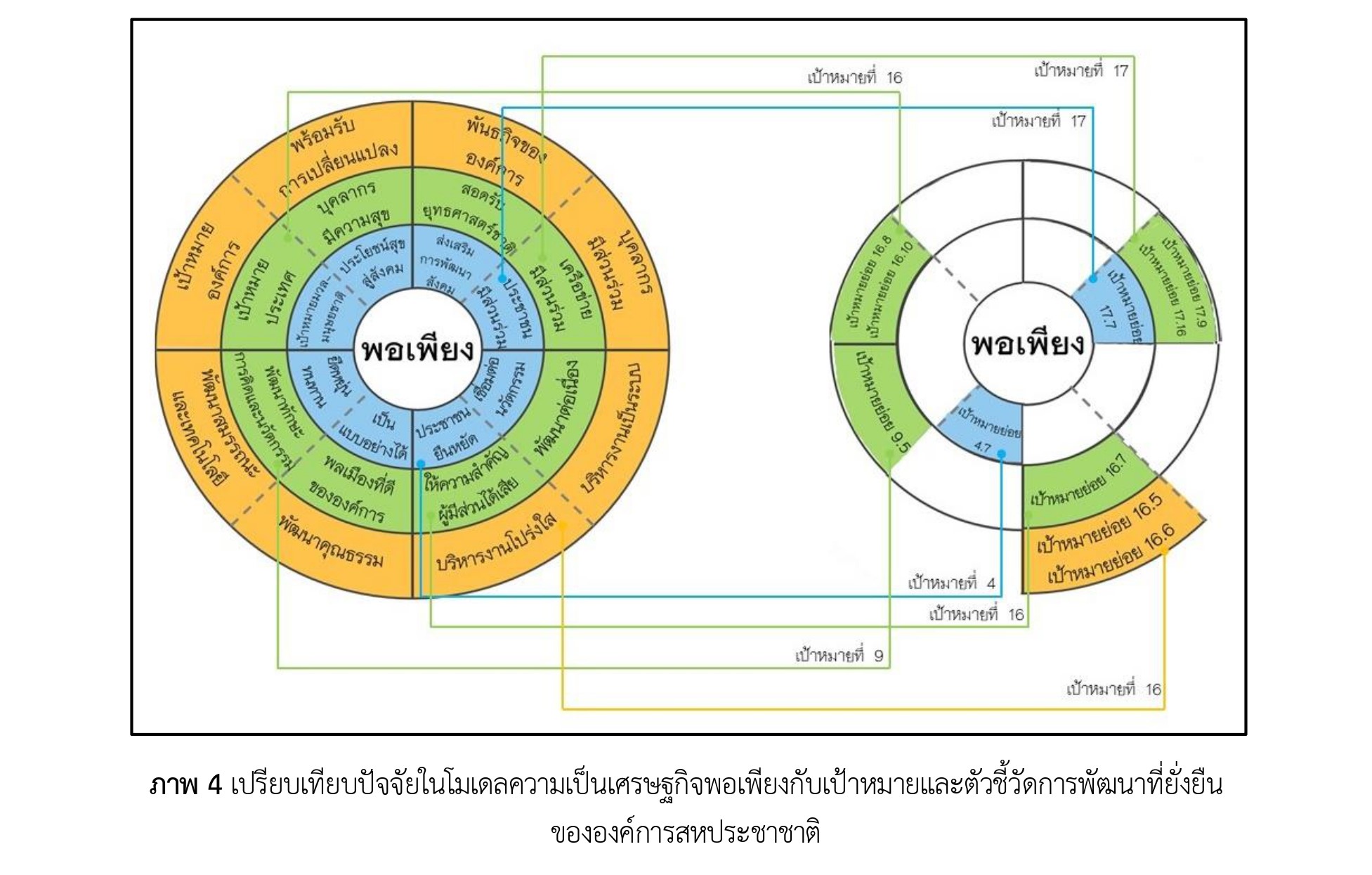Thai Public Administration Towards Sustainable Development
DOI:
https://doi.org/10.14456/psruhss.2024.6Keywords:
Public administration, Sufficiency economy philosophy, Sustainable development, 20 year national strategic plan, United nations sustainable development goalsAbstract
This article presents research that aims to refine a model of Thai public administration based on the Sufficiency Economy Philosophy driving towards sustainable development and to compare the implementation of the Sufficiency Economy Philosophy (SEP), the National Strategy in Government efficiency and better access to public services, and the United Nations Sustainable Development Goals (SDGs) implemented in Thai government agencies. The research adopts content analysis to analyze interview data collected from 15 departments/offices management under the Ministry of Agriculture and Cooperatives using semi-structured interviews, and secondary data collected from other related research studies. The results reveal that there are two major issues to be revised in the SEP model; i.e., developing resilience competence and societal citizenship behavior for officers, and promoting people engagement in society development. Implementing public administration based on the SEP plays a key role in moving Thailand towards sustainable development. The analysis reveals that the goals and indicators within the national strategy generally fall into the entry-level, called partial practice level, in the Sufficiency Economy (SE) model, which reflects the method of practice. The comparison between the SE model and the UN’s SDGs reveals that the SDGs focus on the indicators of the process, which are driving mechanisms toward the SDGs. However, all three frameworks confirm that sustainable development must be addressed from the foundation with consideration given to surrounding dimensions within the context. In addition, sustainable development also requires collaboration among stakeholders, and human development is needed as the basis. By this, digital technology is one of the key components of driving toward sustainable development.
References
กัลยาณี เสนาสุ, และบงกช เจนจรัสสกุล. (2562). การบริหารราชการบนพื้นฐานปรัชญาของเศรษฐกิจพอเพียง (รายงานการวิจัย). กรุงเทพฯ: สำนักงานกองทุนสนับสนุนการวิจัย.
ฉัตรณรงค์ศักดิ์ สุธรรมดี, และจินตกานด์ สุธรรมดี. (2560). บทบาทของปรัชญาของเศรษฐกิจพอเพียงต่อการปฏิรูปประเทศไทย. วารสารมนุษยศาสตร์และสังคมศาสตร์ มหาวิทยาลัยราชภัฏสุรินทร์, 19(1), 187-196.
ทรงพล วันสูงเนิน, และปิยนุช เวทย์วิวรณ์. (2559). การประยุกต์ใช้หลักปรัชญาเศรษฐกิจพอเพียงในการบริหารจัดการผู้รับเหมาก่อสร้างขนาดกลางและขนาดย่อมในประเทศไทย. Research and Development Journal, 27(4), 7-17.
ธมลวรรณ พระเมือง, และเพ็ญณี แนรอท. (2557). สภาพการปฏิบัติงานภายใต้แนวคิดปรัชญาเศรษฐกิจพอเพียง
ของพนักงานส่วนตำบลในเขตอำเภอบ้านแฮด จังหวัดขอนแก่น. วารสารวิจัยและพัฒนา มหาวิทยาลัยราชภัฏเลย, 9(27), 30-38.
มูลนิธิสถาบันวิจัยและพัฒนาประเทศตามปรัชญาของเศรษฐกิจพอเพียง. (ม.ป.ป). การประยุกต์ใช้ปรัชญาของเศรษฐกิจพอเพียงของภาครัฐ. สืบค้น 27 มิถุนายน 2561, จาก http://www.ldd.go.th/Web_LDDEconomy/PDF/Title_3.pdf
สำนักงานคณะกรรมการข้าราชการพลเรือน. (2562). ยุทธศาสตร์ชาติ (เอกสารนำเสนอ). สืบค้น 29 พฤษภาคม 2565, จาก https://www.ocsc.go.th/sites/default/files/attachment/page/99049.pdf
สำนักงานคณะกรรมการพัฒนาการเศรษฐกิจและสังคมแห่งชาติ. (2560). ปรัชญาของเศรษฐกิจพอเพียงและ
การประยุกต์ใช้. สืบค้น 31 สิงหาคม 2561, จากhttp://social.nesdb.go.th/social/sep/Book/2560/sufficiency.pdf
สำนักงานสภาพัฒนาการเศรษฐกิจและสังคมแห่งชาติ. (2561). แผนแม่บทภายใต้ยุทธศาสตร์ชาติ. สืบค้น 29 พฤษภาคม 2565, จาก http://nscr.nesdc.go.th/master-plans/
สำนักงานสภาพัฒนาการเศรษฐกิจและสังคมแห่งชาติ. (2562). รายงานสรุปผลการดำเนินการตามยุทธศาสตร์ชาติ ประจำปี 2563. สืบค้น 29 พฤษภาคม 2565, จาก http://nscr.nesdc.go.th/nscr_report/
สำนักงานสภาพัฒนาการเศรษฐกิจและสังคมแห่งชาติ. (2564). รายงานความก้าวหน้าเป้าหมายการพัฒนาที่ยั่งยืนของประเทศไทย พ.ศ. 2559-2563. สืบค้น 27 พฤษภาคม 2565, จาก https://sdgs.nesdc.go.th/wp-content/uploads/2021/11/Thailands-SDGs-report-2016-2020-book_for-web-1.pdf
สำนักงานสภาพัฒนาการเศรษฐกิจและสังคมแห่งชาติ. (2565ก). เกี่ยวกับ SDGs. สืบค้น 27 พฤษภาคม 2565, จาก https://bit.ly/3wT2zL8
สำนักงานสภาพัฒนาการเศรษฐกิจและสังคมแห่งชาติ. (2565ข). กรอบความร่วมมือระหว่างไทยและสหประชาชาติ พ.ศ. 2565–2569. สืบค้น 30 พฤษภาคม 2565, จาก https://sdgs.nesdc.go.th/5-years-unsdcf/
เสกสรรค์ สนวา, และสุพัฒนา ศรีบุตรดี. (2560). การประยุกต์ปรัชญาของเศรษฐกิจพอเพียงกับการพัฒนาชุมชนในศตวรรษที่ 21. วารสารมนุษยศาสตร์และสังคมศาสตร์ มหาวิทยาลัยราชภัฏสุรินทร์, 19(1), 153-168.
หอการค้าไทยและสภาหอการค้าแห่งประเทศไทย. (2565). คู่มือตัวชี้วัดผลลัพธ์การพัฒนาชุมชนที่ยั่งยืนด้วยการประยุกต์ใช้ปรัชญาของเศรษฐกิจพอเพียง. กรุงเทพฯ: ซี.เอ็ม.เอส พิมพ์ดิจิตอล.
อดิศร์ อิศรางกูร ณ อยุธยา. (2556). การดำเนินงานตามหลักเศรษฐกิจพอเพียงในระบบราชการ. สืบค้น 25 พฤษภาคม 2559, http://cse.nida.ac.th/main/images/6_Gov.pdf
อภิชัย พันธเสน. (2560). การวิจัยและพัฒนาเพื่อขับเคลื่อนเศรษฐกิจพอเพียงในภาพรวม. กรุงเทพฯ: สำนักงานกองทุนสนับสนุนการวิจัย.
Annosi, M. C., Brunetta, F., Capo, F., & Heideveld, L. (2020). Digitalization in the agri-food industry: The relationship between technology and sustainable development. Management Decision, 58(8), 1737-1757. https://doi.org/10.1108/MD-09-2019-1328
Brundtland, G. H. (1987). Our common future, from one earth to one world. An overview by the world commission on environment and development. Retrieved June 7, 2022, from https://sustainabledevelopment.un.org/content/documents/5987our-common-future.pdf
Kantabutra, S., & Ketprapakorn, N. (2020). Toward a theory of corporate sustainability: A theoretical integration and exploration. Journal of Cleaner Production, 270. https://doi.org/10.1016/j.jclepro.2020.122292
Kantabutra, S., & Siebenhuner, T. (2011). Predicting Corporate Sustainability: A Thai Approach. Journal of Applied Business Research, 27(6), 123-134. https://doi.org/10.19030/jabr.v27i6.6471
Khunthongjan, S., & Wiboonpongse, A. (2010). A Study of Performance of SMEs in their Application of Sufficiency Economy Philosophy. GMSARN International Journal, 4, 177-182. http://gmsarnjournal.com/home/wp-content/uploads/2015/08/vol4no4-4.pdf
Sachs, J. D., Schmidt-Traub, G., Mazzucato, M., Messner, D., Nakicenovic, N., & Rockström, J. (2019). Six transformations to achieve the sustainable development goals. Nature sustainability, 2, 805-814.
Shone, J. J. (2014). The Sufficiency Economy Philosophy SEP and its international role in Sustainable Development as seen in application in the SEP model villages of the Lao P.D.R. and Timor-Leste. In the 3rd MSSRC International Conference on "Mekong Region and ASEAN in Transition: People and transborder issues. Ubon Ratchathani: Ubon ratchahani University and the University of Wisonsin (Madison).
Willis, K. (2016). International development planning and the sustainable development goals (SDGs), International Development Planning Review, 38(2), 105-111. https://doi.org/10.3828/idpr.2016.11

Downloads
Published
How to Cite
Issue
Section
License
Copyright (c) 2024 Humanities and Social Sciences Journal of Pibulsongkram Rajabhat University

This work is licensed under a Creative Commons Attribution-NonCommercial-NoDerivatives 4.0 International License.
Any articles or comments appearing in the Journal of Humanities and Social Sciences, Rajabhat Phibulsongkram University, are the intellectual property of the authors, and do not necessarily reflect the views of the editorial board. Published articles are copyrighted by the Journal of Humanities and Social Sciences, Rajabhat Phibulsongkram University.








